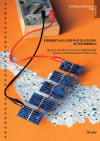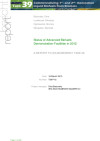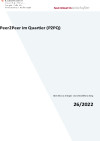Suchergebnisse für "Factsheet: Energietechnologien gestalten, die für alle sinnvoll und nutzbar sind"
sewageENERGYrecovery - Performance comparison of different wastewater heat recovery systems for renewable heat generation
Independent detailed testing of the performance and efficiency of different wastewater heat recovery systems in actual operation by analysing measurement data. Evaluation of the analysed systems with regard to their optimal application possibilities.
Fit4Klim - Fit through education for the climate
The aim of the project is to develop and test customised training courses to qualify cities and municipalities in the areas of climate change adaptation and climate protection, spatial planning, green finance, energy and mobility.
SIMPLE AD Evaluator - S.I.M.P.L.E. Sustainable Integration Modeling and Predictive Leveraging Evaluator
The SIMPLE AD Evaluator fills an existing gap in sustainable local planning by providing a low-threshold and collaborative evaluation tool for early planning phases. By linking questionnaires with System Dynamics models, the tool delivers well-founded decision-making foundations and customized sustainability checklists. This supports municipalities, project developers, and decision-makers in achieving a strategic and cost-efficient sustainable transformation from concept to implementation.
Verbreitung Der Photovoltaik In Österreich

Der 200-KW-Photovoltaik-Breitentest Soziologische Begleitforschung
Forschungsforum
2/1998
Herausgeber: BMVIT
Deutsch, 6 Seiten
Downloads zur Publikation
Kontakt
IEA-DSM Spotlight-Newsletter #64, März 2017

Der Themenfokus des Newsletter liegt auf dem Nutzen von Verhaltensänderungen, der Wirtschaftlichkeit von Gebäudenachrüstungen sowie der Schweizer Energiestrategie 2050
Herausgeber: IEA DSM
Englisch, 7 Seiten
Downloads zur Publikation
Performance Evaluation of Lighting and Daylighting Retrofits: Results from IEA SHC Task 50

Erste Ergebnisse aus den Fallstudien zu Beleuchtungssanierungen in Nicht-Wohngebäuden im Rahmen des Subtask D "Case Studies" des IEA SHC Task 50 wurden auf der SHC 2015, der International Conference on Solar Heating and Cooling for Buildings and Industry, vorgestellt.
Marie-Claude Dubois, Niko Gentile, Claudia Naves, David Amorim, Werner Osterhaus, Sophie Stoffer, Roman Jakobiak, David Geisler-Moroder, Barbara Matusiak, Fredrik Martens Onarheim, Eino Tetri
Herausgeber: Elsevier, Energy Procedia, SHC 2015, International Conference on Solar Heating and Cooling for Buildings and Industry, Istanbul
Englisch, 10 Seiten
Downloads zur Publikation
Konferenz: 2. Puchberger Wirbelschichttreffen
19. Oct 2009 -
20. Oct 2009
Puchberg am Schneeberg , AT
Vom 19. - 20. Oktober 2009 findet in Puchberg am Schneeberg (NÖ) das 2. Puchberger Wirbelschichttreffenstatt. Das Treffen dient vor allem dem direkten Erfahrungsaustausch und der Weiterentwicklung der Wirbelschichttechnologie.
Status of Advanced Biofuels Demonstration Facilities in 2012

Der Bericht gibt einen Überblick über den Stand der Technik der Umwandlungstechnologien von Biomasse zu fortgeschrittenen Biotreibstoffen und stellt eine Ergänzung zu der vorhandenen Demonstrationsanlagen-Datenbank dar.
Herausgeber: IEA Bioenergy Task 39, BIOENERGY 2020+
Englisch, 209 Seiten
Downloads zur Publikation
LifeCycle Tower auf dem ERSCP2012
Auf dem European Round Table for Sustainable Consumption and Production 2012 stellte Michael Zangerl von Cree das Baukonzept des LifeCycle Towers in Rahmen der "Battle of Towers" vor. Eine Exkursion führte zum "Haus der Zukunft Plus"-Demonstrationsgebäude, das in Modulbauweise errichtet wird.
P2PQ - Peer2Peer im Quartier

Das Projekt Peer2Peer im Quartier befasst sich mit der konkreten Umsetzung von Anwendungen zu Photovoltaik-Eigenverbrauchsoptimierung sowie Peer-to-Peer-Beziehungen auf Basis der Blockchain-Technologie in Quartieren und deren Validierung im Echtbetrieb.
Schriftenreihe
26/2022
Herausgeber: BMK
Deutsch, 43 Seiten
Downloads zur Publikation
NEBKrit - Quality criteria for buildings and neighbourhoods on the basis of the New European Bauhaus
Develop criteria of aesthetics and social inclusion based on the values of the New European Bauhaus to complement existing sustainability criteria in order to evaluate buildings and neighbourhoods more broadly. Since todayʼs necessary transformation of the economy always includes cultural and social aspects, such a broader assessment makes more sense than todayʼs usual methods.
Film "Bauen mit Hausverstand - Das Haus der Zukunft"

Dokumentation über ambitionierte Pilotprojekte vom ersten Spatenstich bis zur Fertigstellung
Mehrsprachig
IEA HPP Annex 32: Heating and Cooling for Low Energy Houses
20. November 2007, 14:00 - 16:30 Uhr
TU Graz - Hörsaal i6, Inffeldgasse 25/D, Graz
Technical Report "Integrated Biogas Systems" (2018)

Applikationen der Biogastechnologie im Hinblick auf Nachhaltigkeit.
Bernadette McCabe und Thomas Schmidt
Herausgeber: IEA Bioenergie Task 37
Englisch, 28 Seiten
Kick-Off Event zum Blue Award 09
10. Nov 2009
Kuppelsaal, Technische Universität Wien, Karlsplatz 13
1040 Wien, AT
Nachhaltigkeit in der Architekturausbildung
IEA PVPS Newsletter 2016

Schwerpunktthema des Newsletters ist eine Übersicht über jüngste Publikationen des IEA PVPS Programmes.
Gaetan Masson
Herausgeber: IEA PVPS Task 1 Chair
Englisch
Downloads zur Publikation
ReSpace – Reclaiming Spaces
ReSpace is developing an AI-based model for identifying, categorizing, and activating sealed areas. Existing data sources (aerial and satellite images, mobile network data, land registry entries) are integrated and enhanced with dynamic analysis to derive evidence-based recommendations for action.
Topview - Methodology for the efficient use of remote sensing data for climate change adaptation and spatial energy planning
Development of integrated approaches to sustainable energy and heat planning in urban areas by utilising remote sensing data and geo-information-based technologies for decision-making in the planning of energy infrastructures and climate adaptation measures.
Aktueller Newsletter - IEA Bioenergy Task 33 "Thermal Gasification of Biomass"
Der erste Newsletter des IEA Bioenergy Task 33 informiert über Aktivitäten innerhalb des Tasks, Hintergrundinformationen zum Thema Biomassevergasung sowie über neueste Entwicklungen in den Mitgliedsländern.
